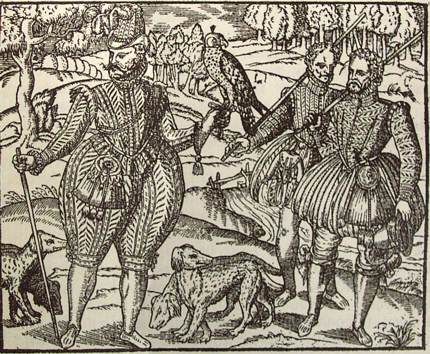Falconry and hawking
A fearful sign of disorder in Macbeth occurs when "A falcon, tow'ring in her pride of place,/Was by a mousing owl hawked at and killed" (2.4.12-13).
Falconry, like hunting, was a sport developed from a necessity--the need to provide meat for the table, especially in winter and spring, when it was not wise to slaughter stock from the farm.
Shakespeare uses the image of the taming of a hawk for the subjection of the wife to her husband. Petruchio not only compares Kate to a hawk, but adopts the same technique for "taming"* her, thus giving a lesson in hawking terminology (and in human brainwashing). Gervase Markham's approach to hawk-taming was rather gentler*.
In Macbeth, Shakespeare alludes to a particularly startling taming strategy: "Come seeling night. . ."*
Juliet and Desdemona as hawks
Juliet compares herself to an untamed hawk, waiting for Romeo to "man" [manage] her, using the hood of night:
Hood my unmanned blood, bating* in my cheeks,
With thy [night's] black mantle, till strange love grow bold,
Think true love acted simple modesty.
(3.2.14-16)
And Othello, doubting the fidelity of Desdemona, thinks of her as a hawk that has reverted to wildness:
If I do prove her haggard*,
Though that her jesses* were my dear heartstrings,
I'd whistle her off and let her down the wind
To prey at fortune.
(3.3.259-62)
In all fairness, Desdemona plans to do a Petruchio in order to get Cassio back into favour:
My lord shall never rest;
I'll watch* him tame, and talk him out of patience.
(3.3.22-3)
The Society for Creative Anachronism has information about early sports and pastimes:
Footnotes
-
Petruchio the hawk-tamer
My falcon now is sharp and passing empty,
And till she stoop she must not be full gorged,
For then she never looks upon her lure.
Another way I have to man my haggard,
To make her come and know her keeper's call,
That is, to watch her, as we watch these kites
That bate and beat, and will not be obedient.
She eat no meat today, nor none shall eat.
Last night she slept not, nor tonight she shall not.
(The Taming of the Shrew, 4.1.179-87)
- sharp
- Fierce with hunger.
- stoop
- Swoop (obediently) to the lure.
- lure
- A dead bird, or a model of one, used to train the hawk to wait at the kill.
- man
- To train, or manage (though the word seems to be derived from the French "main," hand).
- watch
- Force to stay awake.
- kites
- Also known as a "glede" (from glide), the kite was formerly common in England.
- bate
- To beat the wings fiercely.
-
Markham on taming
Gervase Markham, full of information as ever, was less violent than Petruchio in taming his hawks:
All hawks generally are manned after one manner, that is to say, by watching and keeping them from sleep, by a continual carrying of them upon your fist, and by a most familiar stroking and playing with them, with the wing of a dead fowl or such like, and by often gazing and looking of them in the face, with a loving and gentle countenance, and so making them acquainted with the man.
-
Seeling
Come seeling night,
Scarf up the tender eye of pitiful day. . .
(Macbeth, 3.2.46-47)
Shakespeare's image is powerful and evocative, when the full significance of the act of seeling a hawk's eye--the first step in its training--is understood.
The wild hawk was kept under control by keeping it blind or partially blind at will. A silk thread was run through the lower eyelid of each eye, and passed over the head, where it could be tied, thus closing or partially closing the eyes.
-
Glossary
- sharp
- Fierce with hunger.
- stoop
- Swoop (obediently) to the lure.
- lure
- A dead bird, or a model of one, used to train the hawk to wait at the kill.
- man
- To train, or manage (though the word seems to be derived from the French "main," hand).
- haggard
- A hawk which has grown in the wild to at least a year old, and is thus much harder to train than one born in captivity.
- watch
- Force to stay awake.
- kites
- Also known as a "glede" (from glide), the kite was formerly common in England.
- bate
- To beat the wings fiercely.
- jesses
- Short straps of leather fixed to the hawk's legs, by which she is held.
